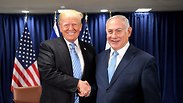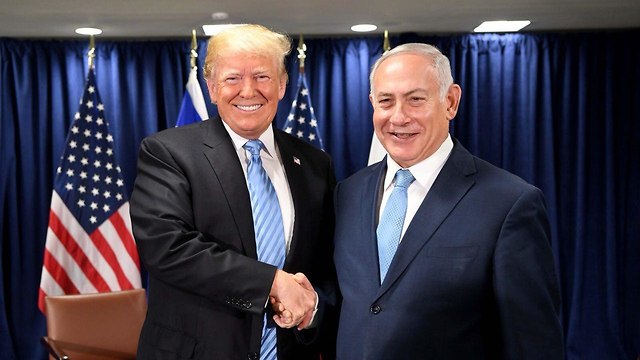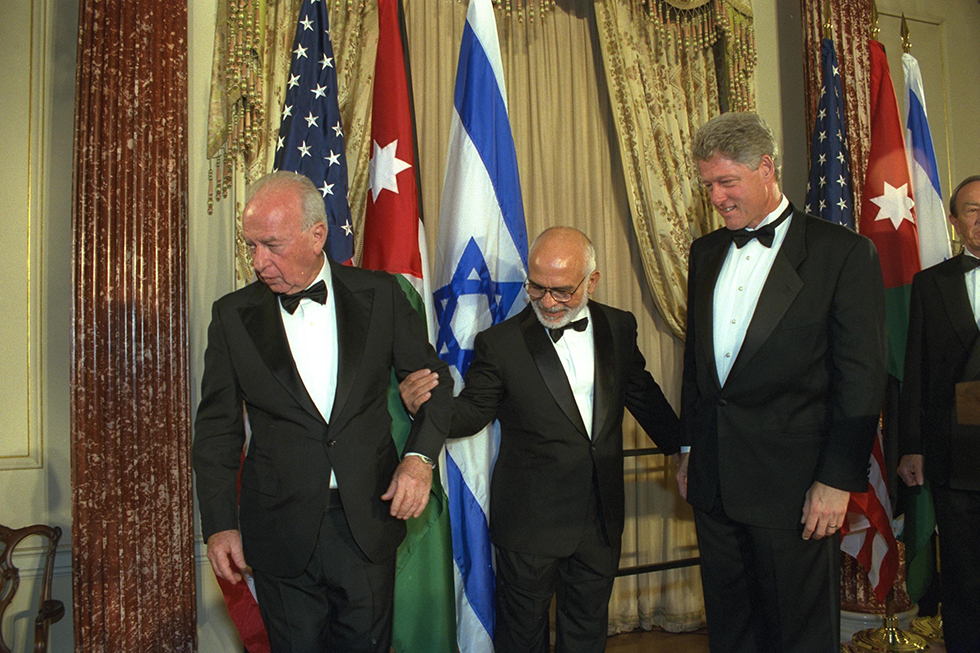
Will US meddle in Israeli elections?
After American peace plan apparently delayed to avoid hurting Netanyahu's re-election bid, Washington may hold state dinner for Israeli premier just weeks ahead of national vote.
Last week, the head of Shin Bet domestic security agency warned that a foreign country "intends to intervene," via cyber attacks, in the Israeli elections set for April 9. Analysts quickly pointed the finger at Russia, given the Kremlin's apparent meddling in the 2016 United States presidential vote, but was that a rush to judgment?
For all the brouhaha, most experts agree that the Jewish state maintains the technological know-how to minimize the impact of similar attempts to influence its political system. As a result, the widespread outrage and partisan battles in the US have not materialized in Israel.
Undoubtedly contributing to the collective Israeli shrug of the shoulders is their familiarity with two decades of foreign intervention in elections. And while most news outlets last week focused on serial manipulators such as Russia, China and Iran, the fact is, Israel's most important strategic ally has historically been the primary culprit, with numerous US leaders having injected themselves into the Israeli electoral process.

Rumors began circulating about the Trump administration's preference for Netanyahu from the moment the White House said it would postpone the release of its much-anticipated Middle East peace plan until after the elections. This was widely seen as an attempt to avoid harming Netanyahu's campaign by forcing him to accept any politically unpalatable concessions to the Palestinians.
Now, the White House reportedly is considering holding a state dinner to express "presidential support" for the Israeli premier when he visits Washington in March. To date, US President Donald Trump has feted only his French counterpart with such pomp and ceremony, and the optics of such a glittering event will play well with Netanyahu's base.
"Israelis view the US as a sort of patron and the majority of them have a positive image of Trump, so his backing could provide a boost to Netanyahu," says Dr. Amir Fuchs, head of the Defending Democratic Values Program at the Israel Democracy Institute. "There is no legal problem with President Trump hosting Netanyahu, although from a democratic point of view this is somewhat problematic. Even so, countries have always done this and it is part of the political game.
"As long as there is transparency and done above table," he says, "the issue of foreign intervention can be limited and need not significantly damage the freedom of elections. Also, it is for this reason countries have laws that protect the integrity of the vote."
Notably, Yitzhak Rabin was the last Israeli prime minister invited to a state dinner at the White House, invited by then-president Bill Clinton along with King Hussein of Jordan to mark the signing of their landmark 1994 peace accord. This rare invite will dovetail nicely with the Netanyahu narrative that only he is capable of navigating Israel's relationship with the lone global superpower and other nations.
"There have been all kinds of attempts by American administrations to interfere in Israeli elections even though the most spectacular example failed," says Prof. Eytan Gilboa, Director of the Center for International Communication at Bar-Ilan University. "This was when Bill Clinton organized a conference in Sinai (in March 1996) essentially in support of then-prime minister Shimon Peres. But Netanyahu went on to shock everyone by winning the elections (two months later).
"It is very difficult to manipulate Israeli public opinion from the outside," Gilboa says, "as voters are informed of what is going on since their consumption of conventional news is one of the highest in the world. While it is obvious the Trump administration is trying to demonstrate support for Netanyahu, the most important factor in the upcoming vote is domestic; namely, whether centrist and leftist parties come together to form a bloc large enough to challenge the premier."
Nevertheless, Netanyahu knows as well as anyone the effect a US president can have on Israel's political system. While he overcame Clinton's backing for Peres, he to this day blames the American leader for his subsequent defeat to Ehud Barak in the 1999 elections. After assuming office, Barak engaged in Clinton's intensive peace process that culminated at Camp David the following year, when then-Palestinian leader Yasser Arafat rejected a comprehensive proposal to end the conflict.

A 2016 Senate inquiry found that funds from the Obama administration ended up in the coffers of the Israel-based V15 organization, whose slogan was "anyone but Bibi," referring to Netanyahu According to the Senate review, the State Department funneled some $350,000 to the group—albeit in accordance with American law—in hopes of unseating the prime minister.
This came amid heightened tensions between Obama and Netanyahu following the Israeli leader's controversial 2015 speech to Congress—arranged by his Republican allies without informing the White House—in which he slammed the nascent Iran nuclear deal.
Many accused Netanyahu of cynically using the speech to boost his standing at home, while Obama refused to meet with him due to a "longstanding practice and principle" of not meeting with "heads of state or candidates in close proximity to their elections, so as to avoid the appearance of influencing a democratic election in a foreign country."
Some viewed Obama's actions as payback for Netanyahu's apparent support for Mitt Romney in the 2012 US presidential vote. According to accounts, Israel's US envoy and former GOP strategist Ron Dermer actively cooperated with Republican operatives and persuaded Netanyahu that Romney was a shoe-in.
"Both Israel and the US meddle indirectly, with actions undertaken intended to alter the elections," says Dr. Yehuda Ben Meir, Senior Research Fellow at the Tel Aviv-based Institute for National Security Studies and an expert on Israeli public opinion. "This includes, for example, when (George HW) Bush conditioned loan guarantees to the (right-wing) Shamir government, earmarked to help absorb Russian immigrants, on the cessation of settlement construction. (Labor Party leader) Yitzhak Rabin went on to win the 1992 elections" and the next year signed the Oslo Accords with the Palestinians.
"Israelis recognize the crucial nature of the relationship with the US and do not want tensions," says Dr. Ben Meir. "This is a (determining) factor for some voters but it can work both ways. Nobody wants to be told who to cast their ballot for and if it is clear the Americans want one candidate over another, then this can boomerang and cancel out any effect."
Article written by Charles Bybelezer
Reprinted with permission from The Media Line










